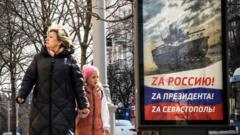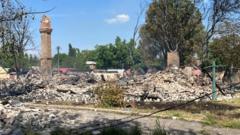Amidst oppression in occupied Ukrainian territories, women like Maria and Sofia reveal the chilling reality of life under Russian control, where expressions of Ukrainian identity face severe repression as they navigate fear, propaganda, and resistance movements.
"Voices of Resistance: Ukrainian Women Speak Against Russian Occupation"

"Voices of Resistance: Ukrainian Women Speak Against Russian Occupation"
Women in Russian-occupied Ukraine share their harrowing experiences, revealing a systematic assault on Ukrainian identity, culture, and autonomy.
In the shadows of Russian-occupied Ukraine, stories of unyielding resistance emerge, particularly from women like Maria and Sofia. Stripped of the right to celebrate Ukrainian traditions and holidays, these voices paint a picture of daily life dominated by fear and repression. “Russians are trying to ban everything Ukrainian here: language, and also traditions,” Maria expresses, embodying the sorrow felt by countless others under Russian control.
As the U.S. presses for peace negotiations, those in occupied regions brace for an uncertain future. The Kremlin's heavy-handed tactics to extinguish Ukrainian identity and dissent include severe punishment for any opposition. Fears loom that Ukraine may be compelled to relinquish parts of its territory, with Moscow eyeing regions like Donetsk, Luhansk, Kherson, and Zaporizhzhia, alongside its illicit annexation of Crimea.
Safety is compromised even in the simplest acts, such as communicating with loved ones. Sofia recounts the dangerous circumstances surrounding her parents, who were once searched by the FSB, accused of connecting with the Ukrainian army. "It's getting really awkward living without Russian IDs," she laments, as her family grapples with the restrictive measures enforced by occupying forces.
Attempts to voice dissent are met with violent repercussions. Maria, a member of an underground female resistance group, courageously shares her experiences despite the looming threat to her life. This atmosphere of paranoia strengthens the resolve of activists, yet creates a chilling environment where conversations can lead to severe consequences.
As Russian narratives envelop public spaces, surveillance systems further tighten control over these regions. Both ordinary citizens and activists face harrowing fates—121 individuals linked to activism vanished or murdered in the first year of invasion, according to Ukrainian rights groups. New draconian laws criminalize mere expressions of support for Ukraine, further stifling dissent.
Despite the oppressive climate, underground movements persist, including Zla Mavka, which focuses on peaceful non-compliance through leafleting, and groups like Atesh, who engage in more active resistance against Russian occupiers. However, with reports of their impact being shrouded in the lack of independent journalism, the extent of these efforts remains uncertain.
Amidst this siege on identity, women like Maria express a resilient refusal to abandon their heritage: “In city centres, everything is covered with Russian propaganda,” she notes unhappily. Schools indoctrinate children with glorified accounts of the Russian army, and local media endeavors to reinforce Moscow’s narratives, crafting a bleak reality for Ukrainian culture.
As Ukraine faces these unprecedented challenges, the voices of its women resonate—serving as both a reminder of enduring resilience and a call to recognize the stakes in this ongoing conflict for national identity and autonomy.




















